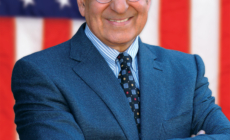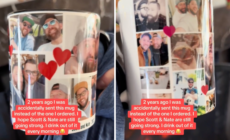-
British band in California robbed at gunpoint one day into tour - 22 mins ago
-
Could the US Housing Market See a ‘Trump Bump’ in 2025? - 26 mins ago
-
FIFA Secures $1 Billion Broadcast Deal With DAZN for Club World Cup - 27 mins ago
-
Pete Hegseth’s Leadership, Alcohol Concerns Would Sink Other Nominees, Ex-Defense Secretary Leon Panetta Says - about 1 hour ago
-
Vikings’ Jordan Addison pleads not guilty to DUI charges in L.A. - about 1 hour ago
-
G.M.’s Ailing China Business Will Deal It a $5 Billion Blow - about 1 hour ago
-
Josh Duggar Seen For First Time in 2 Years in New Prison Photos - 2 hours ago
-
With Assad Challenged, a Push to Cut Syria’s Ties to Iran Grows More Unlikely - 2 hours ago
-
Woman Sent the Wrong Personalized Gift Finds Rightful Owner 2 Years Later - 2 hours ago
-
North Carolina Town Sues Duke Energy Over Climate Change - 3 hours ago
Valadao and Salas in tight race for California’s 22nd Congressional District
The Central Valley race between Republican Rep. David Valadao and his Democratic challenger Rudy Salas for California’s 22nd Congressional District was too close to call on election night, with officials continuing to count votes.
The hotly contested race that Democrats and Republicans poured millions of dollars into was one of several in California that could help determine which party controls Congress next year. It was a rematch for two men known for their moderate politics: When Salas challenged Valadao in 2022, he lost by about 3,100 votes.
The rural swing district spans portions of Kern, Kings and Tulare counties and includes Hanford south to Bakersfield. The economy is dominated by agriculture, and more than 70% of residents are Latino. Here, 43% of voters are registered Democrats compared with 26% registered as Republican and 23% with no party preference. The Central Valley is home to many conservative Democrats, who often vote differently than those in liberal metro areas like Los Angeles and the Bay Area.
The district has long been represented by Valadao, who was first elected to Congress in 2012 and reclaimed the seat in 2020 after losing in 2018. Valadao was considered a vulnerable Republican because he is one of the few lawmakers still in office who voted to impeach then-President Trump in 2021 and has declined to endorse the Republican presidential nominee this election.
The candidates hail from different parts of the Central Valley’s agricultural landscape: Valadao is a dairy farmer with Portuguese heritage while Salas grew up in a Latino farmworking family. Valadao campaigned on his record in Congress, pointing to funds that he secured for local projects and police departments to show his advocacy for the region.
Salas served in the California Assembly for 10 years and later became a lecturer in political science at Cal State Bakersfield. He told The Times earlier this year that he decided to run again because he felt residents were excited about the prospect of change. While knocking on doors, he said voters were concerned about healthcare and reproductive rights, two issues that he said he and Valadao were far apart on.
The two have opposing views on abortion rights. While in the Assembly, Salas supported the 2022 statewide ballot measure that enshrined the rights to contraception and abortion in the California Constitution. Valadao previously co-sponsored the Life at Conception Act, a failed House bill that would have banned abortion nationwide with no exceptions. He has since shifted his position to support exceptions for rape, incest and if the mother’s life is at risk.
On healthcare, Salas supports the Affordable Care Act and has criticized Valadao for voting against the Inflation Reduction Act that included a monthly cap of $35 for insulin for Medicare enrollees. Valadao, who supports a market-based approach to healthcare reform, said he supports lower costs for medicine but referred to the $35 limit for insulin as an “arbitrary cap.”
Source link

















